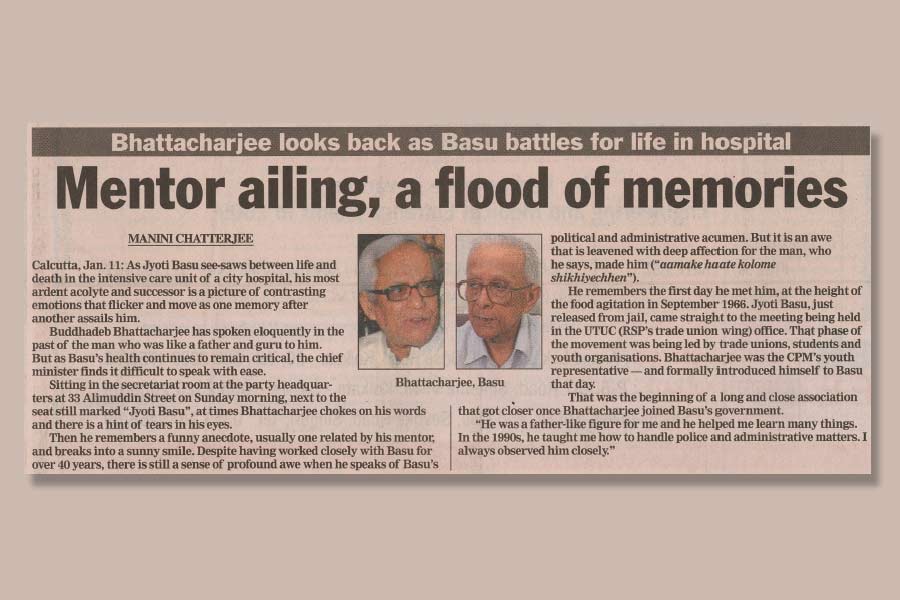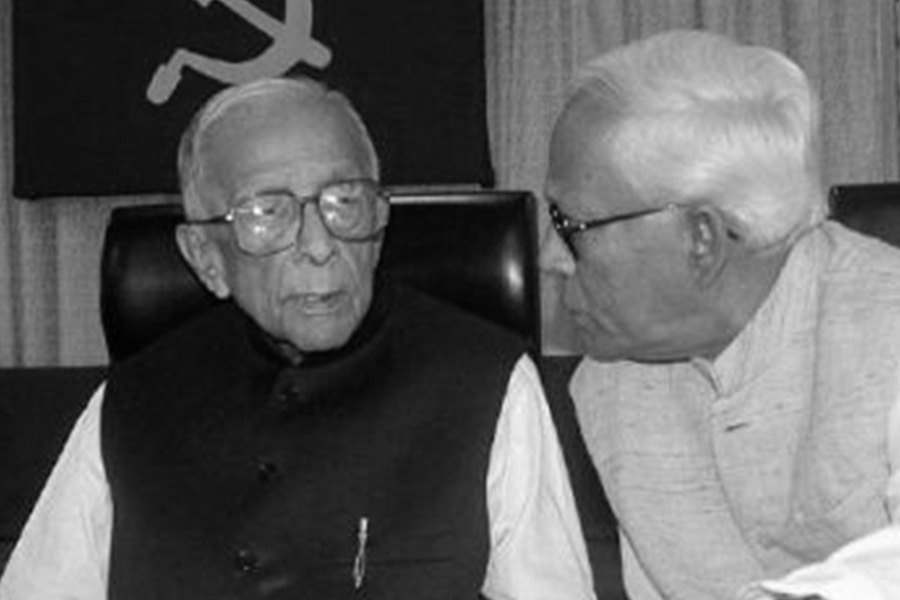Buddhadeb Bhattacharjee, the last Marxist chief minister of Bengal who succeeded Jyoti Basu and was at the helm till May 2011, passed away on Thursday morning. Years ago, in an interview to Manini Chatterjee of The Telegraph (published on January 12, 2010), Bhattacharya spoke about his mentor who was then in hospital battling for his life. “He made me (aamake haate kolome shikhiyechhen),” Bhattacharya said, often choking on his words, betraying a sense of profound awe that was leavened with deep affection. Here is the full interview.
As Jyoti Basu see-saws between life and death in the intensive care unit of a city hospital, his most ardent acolyte and successor is a picture of contrasting emotions that flicker and move as one memory after another assails him.
Buddhadeb Bhattacharjee has spoken eloquently in the past of the man who was like a father and guru to him. But as Basu's health continues to remain critical, the chief minister finds it difficult to speak with ease.
Sitting in the secretariat room at the party headquarters at 33 Alimuddin Street on Sunday morning, next to the seat still marked "Jyoti Basu", at times Bhattacharjee chokes on his words and there is a hint of tears in his eyes.
Then he remembers a funny anecdote, usually one related by his mentor, and breaks into a sunny smile. Despite having worked closely with Basu for over 40 years, there is still a sense of profound awe when he speaks of Basu's political and administrative acumen. But it is an awe that is leavened with deep affection for the man, who he says, made him ("aamake haate kolome shikhiyechhen").
He remembers the first day he met him, at the height of the food agitation in September 1966. Jyoti Basu, just released from jail, came straight to the meeting being held in the UTUC (RSP's trade union wing) office. That phase of the movement was being led by trade unions, students and youth organisations. Bhattacharjee was the CPM's youth representative - and formally introduced himself to Basu that day.
That was the beginning of a long and close association that got closer once Bhattacharjee joined Basu's government.

"He was a father-like figure for me and he helped me learn many things. In the 1990s, he taught me how to handle police and administrative matters. I always observed him closely."
Basu's most amazing quality was that "in any complicated situation - say a communally charged situation or a breakdown of law and order - when he met officials, he could take a decision immediately. He would take into account all the dimensions of a problem and make a clear and quick judgement." That did not mean he was reckless or hasty in any way. The decisions were quick and subsequent events invariably proved that they were spot on, too.
That ability to make clear-cut administrative decisions combined with an innate talent to connect with the masses.
Bhattacharjee recalls the time when Basu was the home minister in the United Front government in the late 1960s and a riot broke out in Telenipara. Basu gave instructions and quickly brought the situation under control.
But he also addressed a big public meeting and took the people - both the majority and minority communities - along. "He did not indulge in demagoguery, he had a no-nonsense approach to things - straight kotha, straight bolte para (straight talk, straight delivery) - that is what made him the most respected mass leader of our times who was both a very good party leader and a good administrator," said Bhattacharjee.
Another quality that has never failed to impress Bhattacharjee was Basu's talent of blending theory and practice, of being able to learn from life around him and fit it into his undying commitment to Marxist ideology. "Since he started out as a trade union activist and remained connected with the TU movement for decades, he always understood the workers' psyche. This really helped when he was formulating the state's industrial policy," said Bhattacharjee.
Although the chief minister does not actually say this, one of his anecdotes makes it clear that the reason Basu - unlike many other communist leaders - never stuck to abstract theory alone was his grounding in actual working-class movements.
It is a story from as far back as 1945. Basu was working among railway workers at the Kanchrapara workshop. The allied forces bombed Hiroshima in August that year. Saroj Mukherjee, then a top leader in Calcutta (who rose to become CPM state secretary), insisted that the enormous import of Hiroshima must be explained to the workers to build their consciousness. He went to the meeting himself and spoke at length on the subject.
A few days later, Nagasaki was bombed. And Basu, then a raw England-returned communist, overheard a rail worker grumbling: "Arre, bomb babu phir aa jayega, aur saara maang barbaad ho jayega. (Oh, that bomb babu - i.e. Saroj Mukherjee - will come back and all our demands will go for a toss)."
Basu often related this anecdote to fellow comrades to underline how difficult it was to transform the economic consciousness of the working class into political consciousness - a struggle that the Left hasn't quite overcome to this day.
Although Basu seldom pontificated on theoretical issues, even when the party was in the midst of fierce ideological debates, it is clear that beneath his "pragmatic" visage, he had a complete grasp of the core of every debate that he displayed through an offhand, witty quip.
This becomes clear from another story Bhattacharjee relates that took place in 1948. That year the then undivided CPI was declared illegal after the "revisionist" general secretary P.C. Joshi had been replaced by the "adventurist" B.T. Ranadive.
The Ranadive thesis (which dismissed Independence as a sham and called for an armed struggle against the Nehru government) held complete sway and party leaders were forced to go underground.
Basu and Indrajit Gupta, both England-returned barristers-turned- communists, shared a room and divided their duties. One cooked and the other did the dishes.
Fed up with the routine, one day Indrajit Gupta asked: "Jyoti, koto din aar baashon maajte hobe (Jyoti, how long must I go on cleaning the dishes)?"
Pat came Basu's reply: "Joto din party line theek na hoy (Until the party corrects its line)."
Those stories from Basu's youth - that reveal so much about the vast experience that made him the living legend that he is - momentarily lighten the brooding atmosphere in the room. But soon the melancholy is back as Bhattacharjee recalls in half sentences how central Basu's guidance has been to the CPM and to him personally.
"He used to regularly come to every party secretariat meeting - he was never late for a single meeting - till recently. And when he could not come any more, we went across to meet him. He gave his opinion, his advice, and was fully alert even when he was admitted to hospital on January 1.." Bhattacharjee says, as his voice trails off and he slips into a reverie, hoping against hope that the veteran of a myriad battles will win this one too.











